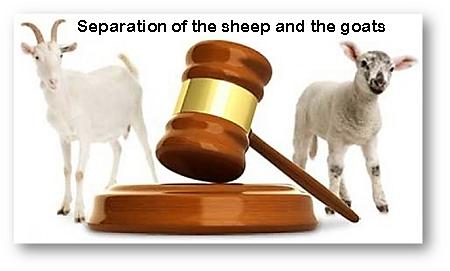Is Hell Real?
Is Hell Real?

Denials of the reality of hell are not uncommon these days. Of course, people who don't at all believe in God or in the "supernatural" have always denied hell – just as they have always denied the existence of heaven. But now there are also a large number of preachers and "Christians" who while professing faith in Christ, nonetheless deny the reality of hell. They believe in heaven, but not in hell.
Arguments supporting this view are usually based on subjective feelings. People just don't see how "God could do that." They cannot reconcile a God who punishes people eternally with the God who loves them. The very thought of hell is in itself nearly unbearable to the human mind. And so many have proceeded to eradicate it also from the Scriptures by way of misguided exegesis.
Establishing that hell is a scriptural teaching can be done by giving our attention to just a few verses. We confine ourselves to the New Testament and especially to the words of Christ. One of the clearest pictures of the Last Judgment is found in Matthew 25. Speaking of the final separation of the sheep and the goats, verse 46 states: "And they will go away into eternal punishment, but the righteous into eternal life." The punishment of the wicked is said to be eternal. It contrasts with the eternal life of the righteous.
Some writers state that the "eternal" character of the punishment refers more to the effect of the punishment than to the punishment itself. Such writers argue that the punishment itself is a single act. The result of the punishment is the annihilation and abolition of the person. But this is bad reasoning. It is the punishment which is said to last forever. And a non-existent human being cannot suffer punishment. If the punishment is eternal, then the person who is punished must live forever.
Extinction of the person is no punishment at all. We might even argue that abolition of the individual would be a blessed oblivion. It's hard to see how the wicked would cry out for the mountains to fall on them if they only saw that their coming fate was extinction forever. When John the Baptist saw wicked people coming to be baptized, he didn't say, "Repent, lest ye be annihilated." No, he said, "Repent, for even now the axe is laid to the root of the trees; every tree therefore that does not bear good fruit is cut down and thrown into the fire." And a little later, we hear that this fire is "unquenchable" (see Luke 3:9, 17).
We can also look to Mark 9:47, 48, where the Lord says these words: "And if your eye causes you to sin, pluck it out; it is better for you to enter life lame than with two feet to be thrown into hell, where their worm does not die, and the fire is not quenched." It may be useful to know that the word which the Lord uses here (and elsewhere) for hell is Gehenna. This word refers to a valley outside Jerusalem where children were at one time sacrificed to the idol Moloch by Jewish kings. This site of idolatry was eventually destroyed by King Josiah and later it became a garbage dump. Smoke was always rising from the stinking heaps of refuse.

So there was decomposition and decay in Gehenna, as well as fire. In Mark 9:47, 48, Jesus speaks of the worm that never dies and the fire which is not quenched. Destruction comes from both the outside (fire) and the inside (worm). There is a constant dying and yet no death. The fire always burns. The worm always gnaws. There is no end, no relief, and no possibility for change. The suffering is eternal. Again, this text can in no way be harmonized with any theory of annihilation. The judgment of God leads to sinners being thrown into the misery of hell which never ends.
We could mention more texts, but these will suffice for now. As far as the nature and location of hell is concerned, we have to confess our ignorance. We should also realize that the language of Scripture concerning hell as symbolic. Hell, for instance, is called the "outer darkness." We know that God is spoken of in the Bible as "light." Therefore, if you are eternally cast away from God, you are logically in the outer darkness. And if hell is a lake of fire, how can it (literally) also be the outer darkness? We have to understand this language as symbolic. But this does not in any way make it less real or less horrifying. The point is simply that just as the description of heaven or the New Jerusalem in Revelation comes to us in pictures, so also the language about hell is symbolic.
We now come to the question: is it fair of God to cast people into hell? If we think about this question, we have to say that it reflects a great deal of human arrogance. We have no business putting God on trial. As if He has to justify His deeds to us, miserable sinners! If we think a little more about this first question, we might even come to ask a better question: "how is it possible that God has not long ago thrown the whole human race into hell?" For that would be right and fair. If every human heart is inclined to rebel against and hate the highest Majesty of God, the Maker of heaven and earth, how could anybody still remain alive in a state of non-hell?
That is the real mystery. Of course, we know that there is a reason for the present situation. God does not immediately cast all human beings into hell because He is pleased to give a time of repentance! There is an opportunity to renounce sin and to turn to God in the name of Christ. Now is the day of salvation. But at a specific time, that day will come to an end. Then the time for public judgment and punishment will have arrived. Then all flesh will witness and participate in the separation of the sheep and the goats!
Today, God gives us warnings. He sends cyclones and disease and famine and accidents. In every one of these happenings, it is as though God is screaming a warning at us and the whole world: repent or perish! The judgment begins in this life, but it comes to its awful culmination on the Last Day of this world.
What should be our attitude to this scriptural teaching of hell?
-
First of all, a profound gratitude that God has proclaimed Jesus Christ to us as Saviour. If we realize that Jesus saves us from the worm that never dies and the fire that is never quenched, from the outer darkness and the lake of fire, will we not show a much great devotion to Him who redeemed us?
-
And secondly, this scriptural teaching may be used to induce in us a healthy fear! Hellfire preaching isn't very popular these days. And Reformed preachers are rightly aware that preaching hell never saved anyone. Only the preaching of Christ and Him crucified can save people. But still, the Bible does not hesitate to warn people about the consequences of rejecting the Lord Jesus and the way of obedience.
We often trivialize our sinful ways of life because we simply don't realize that our sins bring us into enormous danger! When we fool around with worldly ways of life, with drinking, with pre-marital sexual relationships, or when we live in greed, jealousy, or when we are totally indifferent to our covenant privileges, do we see that we are in danger of hell? Does that scare you? I hope so, for as one writer said, "If you are not afraid of hell, you are almost certainly going there." God is not mocked. Those who spurn the Son of God, who outrage the Spirit of grace by their godless way of life, will meet their doom. "For we know Him who said, 'Vengeance is mine, I will repay.' And again, The Lord will judge His people.' It is a fearful thing to fall into the hands of the living God" (Hebrews 10:30, 31).
Again, let it be said that the point of speaking about hell is not to scare us out of our wits. Instead, as another writer said, "the point is to scare us into our wits." The point is to make us aware of our true situation.

Thus, when confronted by these divine threats, what can we do but humble ourselves and stand in awe of the Living God? What can we do but warn a threatened world that the terror of the Lord is about to fall upon it? What a motive for evangelism! It is not the only motive, but certainly a central one. Yes, what can we do but run to the Lord Jesus, who is the only exit from the highway to hell! He bore the wrath of God against our sins. Let the person who wants to accuse God of being unfair look to the cross. There we see what our salvation cost God – the sacrifice of His own Son.
Anybody who spurns that sacrifice by not believing in Jesus or by living a godless life – that person – unless he/she repents – is on the way to hell. Baptism in the church won't save you. Nor will an outer profession of faith.
Only this saves: repentance and faith and living in holy fear.

Add new comment